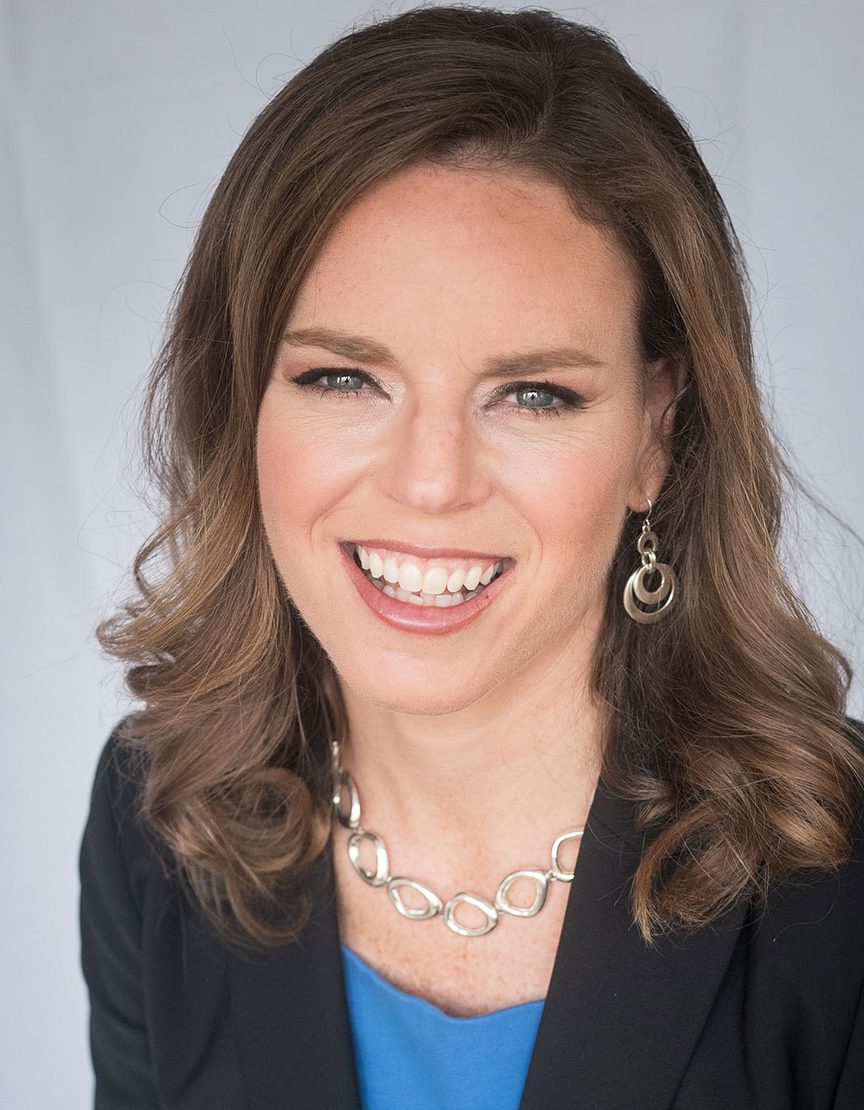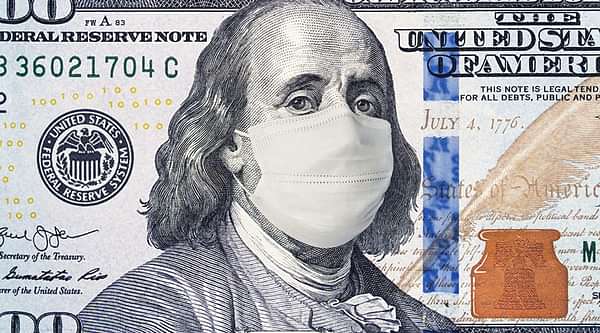
April 09, 2020
The mother of all recessions
Economist Megan Greene ’97 explains why this crisis is so uniqueby Allyson Irish
Considered one of the top economists in the world, Megan Greene ’97 finds herself struggling like the rest of us during this self-quarantine, working from her kitchen table, Zooming into conferences, and taking solace in her daily runs along the Charles River.
In the following interview, Greene, senior fellow at the Mossavar-Rahmani Center for Business and Government at the Harvard Kennedy School, shares her insights on the COVID-19 pandemic and how this crisis is like nothing the world has ever seen before.
Is the U.S. prepared to assist people financially if this crisis lasts a long time?
Most of the U.S. aid programs right now are meant to bridge us for a few months with the idea that the economy will come roaring back. But increasingly that looks like a pipe dream.
The narrative has shifted. Initially we thought the recovery from the virus would happen relatively quickly. But I have colleagues at the Harvard School of Public Health who are saying we can’t simply let everyone out [from quarantine] all at once. There is too much we don’t know. As the number of cases falls to a certain level we can start to let people out, but we also don’t want to overwhelm our health services. It’s not going to be a linear recovery. There will be intermittent isolation as we figure out the right balance between allowing economic activity and reducing the number of new cases.
I think emerging markets are really the unreported story in all of this. They are getting hit in the financial markets because the U.S. dollar is strong and rising and this means it will be harder for them to pay back debt. And their health services are even less prepared than ours. You can’t really practice social distancing in a slum in Johannesburg, for example. As the U.S. and Europe start to come out of this, it’s possible that emerging markets will go deeper into it. It looks more like we are not synchronized at all and therefore a global “V-shaped” recovery just isn’t realistic.
There’s a lot of discussion about how ill-prepared we were/are to manage this type of pandemic. What could have been done to prepare?
I don’t think we could have done anything, financially. Most of the weakness has been on the health policy front. In the U.S. and the U.K., we have been worrying about economic stimulus without worrying about health policy. We really can’t spark an economic recovery until we can contain the virus.
The U.S. used to have a government pandemic team, but it has been disbanded and a lot of the policy makers who would have been coordinating a response have been fired and not replaced, or demoted. We’ve weakened our social safety net in the meantime. SNAP [federal Supplemental Nutrition Assistance Program] benefits and unemployment insurance benefits are fairly weak. If we had a better social safety net, then all of those who already lost their jobs would have started off in a better place.
I do think that creating automatic stabilizers would be helpful. A good example in the labor market is a new indicator called the Sahm Rule [see sidebar]. Basically, it’s a measure showing that if unemployment rises a certain amount, then we know within some level of certainty that we are going into a recession. So if that were triggered, we could automatically respond by beefing up unemployment insurance, increasing SNAP benefits, and mailing out checks to people who need them. This would take the politics out of it. Just as importantly, the same trigger could tell us when to stop this accommodation.
Currently we rely on the National Bureau of Economic Research, but they often don’t know we are in a recession until several months after. The Sahm Rule is a much more real-time indicator.

You’ve advocated for the use of work-sharing programs to mitigate the negative economic impact of this crisis. What is this and how can it help?
Work-sharing is something that’s been done in Europe for some time and that’s happening now. The idea is that if you can keep people on the payroll and keep their jobs—even if people are only doing a portion of their jobs—then, when we get to the other side of this we can ramp up more quickly. It means the recovery would be faster. This is opposite of what the U.S. is doing—allowing companies to furlough workers so they can claim unemployment benefits.
There are pros and cons but if this is just temporary, work-sharing schemes are really effective. If it is a couple of months, then we can all go back to our jobs. But if it lasts a lot longer, work-sharing is more expensive. All of this depends on how long the virus lasts.
In terms of comparison, what other world event has had such an impact on the global economy?
These are staggering numbers. We’ve never seen figures like this—nearly 10 million claimed for unemployment benefits between March 16-27. The Spanish flu may be the best comparison. A lot has changed, and our policies and tools are very different now. We know a lot more about what works and what doesn’t. Our health policy has come a long way. But [Spanish flu] could be a model in terms of a sudden stop in economic activity. You have to keep in mind, it also coincided with World War I, so it’s hard to parse out the effects of the war’s influence on the world vs. the influenza’s. A lot of people are comparing this to the financial crisis of 2008 and 2009, which is not a great comparison. That started off as a financial crisis and then it really seeped into the economy. The nature of this is very different; it started as an economic sudden stop and then seeped into financial markets. I do think this will be the “mother of all recessions.” It just depends on how long it takes us to contain the virus.
A lot of people are comparing this to the financial crisis of 2008 and 2009, which is not a great comparison. That started off as a financial crisis and then it really seeped into the economy. The nature of this is very different; it started as an economic sudden stop and then seeped into financial markets.
”What do you think of the stimulus package passed by Congress? Will it help? Is it enough?
I think there was a lot that was really good in that bill. Relative to 2008-2009, Congress this time made a concerted effort to not only bail out big companies, but also to help Main Street. I think [this time] they got the balance a lot better in terms of helping people who really need it. If we can get money to people quickly, it is a good idea.
Mailing checks doesn’t help people who had well paid jobs but have lost their jobs in the face of this crisis because it’s based on last year’s tax returns, but it helps many of the most vulnerable in society. And those people who don’t need the check immediately can hang on to the money and use it in the future to really kick-start the recovery.
 “I do think this will be the “mother of all recessions,” says Greene. It just depends on how long it takes us to contain the virus.”
“I do think this will be the “mother of all recessions,” says Greene. It just depends on how long it takes us to contain the virus.”
The stimulus package also includes money for SMEs [small and medium-sized enterprise], and that’s helpful. I’m glad that some restrictions were put on bailouts to larger companies regarding dividends and executive pay so the money doesn’t get distributed to shareholders or to line the C-suite’s pockets.
There are a few things missing from this bill, particularly support for the states. All states except Vermont have a balanced budget rule, which means they are on the front lines of this crisis while also facing a complete and sudden stop in their revenues. They will have to start laying off people. So, if the government can get money to the states that would be helpful. We might also have to figure out a way to support big companies that are stalwarts in our economy but have debt that is dicey so the Fed is not really allowed to lend to them. Macy’s and Gap are good examples.
Out of the $2.2 trillion stimulus package, only around $150 billion was allocated for health policy. We are kind of doing it backward. Our first response should have been to provide the funding for necessary personal protective equipment, for ventilators, and to finance work on the vaccine. We will need more money for the public health side of this.
What is your best advice to families who may be struggling to pay their bills while watching their retirement savings slip away?
I would say to take advantage of the programs that are available. Those near to retirement are in a real sequence risk, so if they can avoid retirement now that would be advisable. For everyone who is looking at their 401(k)s, like me, someone told me that you should treat your 401(k) just like your face: just don’t touch it! Most people need to take a long-term view and have a balanced portfolio.
You indicated in your recent Financial Times article that there might be a silver lining to this crisis. Please elaborate.
I can think of a couple of positives. A lot of people are talking about how globalization is going to fall because of this and we can’t rely on China for all of our goods. I think that physical globalization will fall as some production is brought back onshore and countries increasingly pursue a go-it-alone, more nationalist approach to growth. But other types of globalization will probably increase, particularly digital globalization. I’m doing a lot more things digitally now, and I can say many of them are more effective. It’s easier for me to do some seminars virtually. More people show up for lectures because it’s easy online and I can moderate more effectively because the questions come in over chat functions and I can group them thematically. I can totally do my job from my kitchen table. I understand that not every job can be done from home, but I think this is going to really accelerate the digital revolution and digital globalization and I think that would be a good thing going forward.
Maybe, too, we all won’t have to live in big cities in order to work and we may find that we can provide as many services as we need with fewer resources, which should boost productivity growth once this crisis is over. Productivity growth was slow in the last recovery. It would be great if we saw a jump there—that’s a positive.
We are also going to have to think differently about the government’s role in the economy and get used to the government having a heavier hand in it. Government has been a huge catalyst in the past, helping to support the bottom rung of our economy. Social Security came out of the Great Depression. The U.K. National Health Service came out of World War II. It’s too early to say we are going to have nationalized health care coming out of this in the U.S., but we might be more receptive to government having a larger role.
Do you have a special message for the Andover community?
I think that Andover’s motto of non sibi is at the center of this. There have been some beautiful things that have come out of this crisis, like people showing more humanity. PA grads have had this notion of supporting community embedded in them and the time to express that is now.
Megan Greene ’97 is a senior fellow at the Mossavar-Rahmani Center for Business and Governmentat the Harvard Kennedy School. Previously, she was global chief economist at John Hancock/Manulife Asset Management, founder and chief economist at Maverick Intelligence, head of European economics at Roubini Global Economics, and the euro crisis expert at the Economist Intelligence Unit. Greene is a frequent keynote speaker and has a biweekly column in the Financial Times on global macroeconomics. She appears regularly on media outlets such as Bloomberg, CNBC, and NPR. Greene holds a B.A. from Princeton and an MSc from Oxford. Follow her on Twitter—@economistmeg
Other Stories

Two new art installations created by Jennifer Cecere ’69 will be installed on campus this spring.




